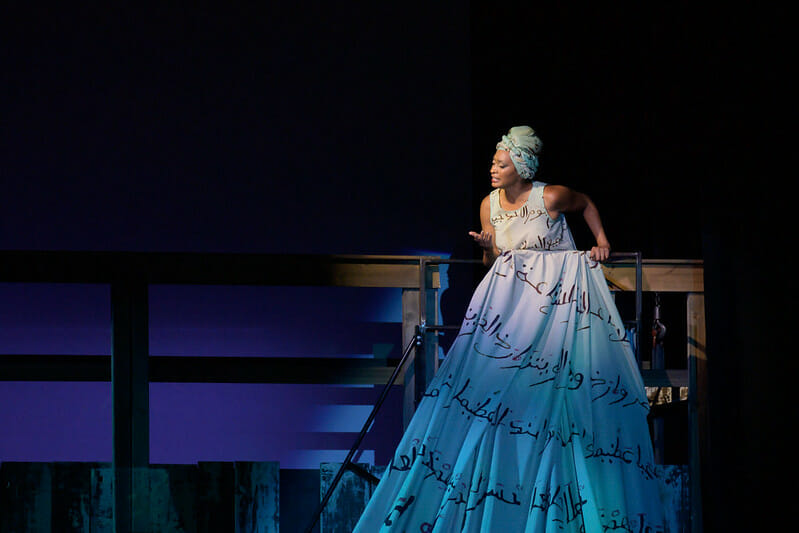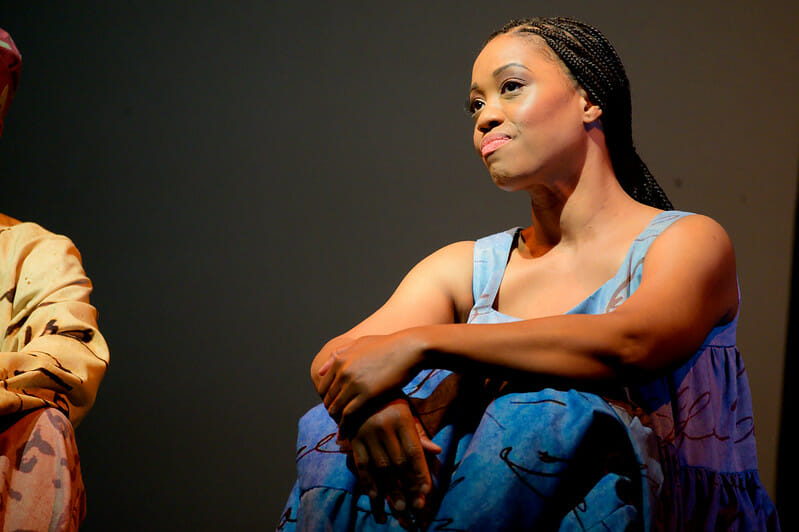[ad_1]
For the first time in three years, Spoleto Festival USA, Charleston’s big binge of a performing arts festival, is fully back in business. The 2020 season was canceled due to the pandemic, and the 2021 season was severely truncated. This time around, all the qualities that make Spoleto a unique destination for classical music, jazz, dance and theater are on display. As was customary pre-pandemic, the festival began on the Thursday prior to Memorial Day weekend and will continue for a total of 17 days, ending June 12. That means it’s still possible to get there and to enjoy whole days of back-to-back performing arts.
There’s so much going on here — this season features 120 different performances — that it’s very possible to be a specialist and focus on a single art form. As usual for me, that means classical music, which at Spoleto tends to be built around chamber music and opera performances (Gian Carlo Menotti, who founded the festival, was an opera composer).
The most anticipated of these has definitely been the world premiere of Omar, an opera by Rhiannon Giddens and Michael Abels — Giddens wrote the libretto and the two collaborated on the score. Omar was commissioned five years ago by festival director Mena Mark Hanna’s predecessor, Nigel Redden, and was planned for the 2020 festival season, then twice postponed due to the pandemic. But Hanna immediately embraced the Omar plan and built much of the season around the theme of “migration, be it forced, exiled, or voluntary.” Indeed, no single work in recent decades has been so clearly singled out as the festival’s primary element, celebrated in the season poster and via forums and panel discussions.

Redden’s retirement wasn’t the only big trauma during Omar’s gestation: Giddens wound up replacing the original director, Charlotte Brathwaite, with Kaneza Schaal after disagreeing with Brathwaite’s vision for staging the work. The challenges continued right up to opening week when Jamez McCorkle, who sang the title role, injured his ankle during a rehearsal three days before the first performance. He sang the first act from a wheelchair, but stood and walked a bit during the second, wearing a special boot.
Omar is based on the real-life story of Omar ibn Said, a Muslim scholar from Senegal who was brought to Charleston in 1807 as a slave. Twenty years after his capture, Omar wrote his autobiography in Arabic, and that is the basis for the opera.
In the first act, we see Omar in his village, leading prayer and interacting with his family, especially his mother. Slave traders arrive, capturing Omar and killing his mother. In the middle passage, we hear the slaves responding to cruel and brutal mistreatment. We hear passionate, painful soliloquies sung by the ghosts of slaves who died during the trip. Omar is brought to the Charleston Slave Market, where the auctioneer maintains a circus-like atmosphere for the assembled buyers. Omar is sold cheaply because of his age (he was then 37, an old man for a slave) to a man named Johnson, whose focuses his cruelty on Omar, whom he perceives as willful and lazy.
When Omar learns Johnson is coming to kill him, he runs away and is captured in Fayetteville, North Carolina. His jailers sell him to Owen, a devout Christian, who is fascinated by his literacy and his Muslim faith. He becomes a devout Christian, which the opera suggests was a delusion, and ultimately writes his autobiography, the only surviving slave text written in Arabic. “I am Omar,” he declares, hoping that his story won’t be forgotten like those of thousands of people brought here as slaves.
The story of Omar is important for the truth it holds, especially for Charleston. Almost half of the slaves brought to America arrived via Charleston; over 70,000 were sold here in one three-year period alone. The slave trade was the major source for the vast wealth of Charleston’s golden age, when those glorious mansions which set the city apart, many of which are now owned by people in the audience, were built. Omar also makes us aware that a significant number of the people brought here as slaves were Muslim, and some were highly literate.

If the fundamental question Omar deals with is “Who was Omar?” then one question about the work itself is: “What is Omar; is it an opera?” The term is a bit fluid, but essentially it describes a theater work which requires trained voices, which is (usually) through-composed, and in which the score is primary. That last piece is the problem here. While it has a fine, eclectic score, the driving force for anyone attending Omar is the narrative — skillfully adapted from Omar’s autobiography.
The score serves to amplify the text, just as in any great piece of music theater (or operetta), the genre I believe is more appropriate for Omar. Does it matter? Probably not for the audience, nor for the opera companies that will go on to present Omar (L.A. Opera is next, with this same production coming there in October; co-commissioning companies also include San Francisco Opera, Lyric Opera of Chicago, and Boston Lyric Opera).
Giddens, a MacArthur Fellow, trained as an opera singer at Oberlin Conservatory and is perhaps best known as the lead singer (and fiddler and banjo player) with the Carolina Chocolate Drops, a Grammy-winning country/blues group. She created the score “the only way I know how,” by singing and playing it, sending the recordings to Abels, a popular film score composer (Bad Education, Allen vs. Farrow), who fleshed out the music and orchestrated the work.
The poetic text is sung primarily as parlando (spoken on pitch), sometimes in Arabic (with, but sometimes without, projected English translation), opening up for some fine arias and ensembles. These range from African American spirituals to richly textured choral works to the distinctive patterns of Arabic music. The opera, which begins in Senegal, opens with percussive, distinctively African sounds, which transition to the Arabic music as Omar prays: sounds which return when he is visited by the ghost of his mother.

At the Johnson Plantation, where the slaves are treated with great cruelty, they sing a spiritual: “Oh Lord How Long?” After Omar arrives in Fayetteville at the Owen Plantation, where the slaves are treated more humanely, they dance to a distinctively Appalachian tune, “Old Corn Likker.” Abels has brought it all together elegantly.
Despite his injury, McCorkle, a fast-rising young tenor, was clearly the star of this show, acting with his voice in the best opera tradition, and embodying his character’s deep reserve of dignity, pride, and religious fervor. In the ending, he professes to be still true to his Muslim faith, meaning his conversion to Christianity was a lie he perpetrated to survive. There is apparently no evidence that this was the case, but it makes for a more dramatic story, and one that better dramatizes the role of Christian masters who “civilized” and controlled the slaves by proselyting them.
Soprano Laquita Mitchell (Bess, in The Atlanta Opera’s Porgy and Bess in 2020) was impressive as Julie, a role created for the opera: At the slave market she tells of the Owen plantation, from which she’d been stolen and to which she ultimately returns, welcoming Omar on his arrival and, in the one of the final scenes, singing a major aria in which she instructs him to write his story, foretelling that “the book will be a miracle.”

Mezzo-soprano Cheryse McLeod Lewis was radiant as Omar’s mother, encouraging and inspiring him from beginning to end. Baritone Malcolm MacKenzie sang both slaveholder roles: first as the cruel one, Johnson, then as the more humane Owen. He sang powerfully in each case but managed to differentiate them: mean-sounding for Johnson, becoming more sensitive for the religious Owen role.
This was the first performance of the new Spoleto Festival USA Chorus, replacing the beloved Westminster Choir College Chorus. The latter has served for decades as the festival’s chorus and provided singers for the smaller opera roles, a function now taken over by the new ensemble. For Omar, a choral ensemble was created from African American chorus members.
Veteran Spoleto conductor John Kennedy conducted the midsize orchestra with energy and finesse. Schaal’s elegant production relies heavily on projections and is built around the Arabic text of Omar’s writings. The ornate script forms the pattern for many of the costumes, and is projected on screens behind the action and, sometimes, on a scrim in front.
To my ear, Omar is the most important new work to emerge from Spoleto, at least since the Menotti era. It is an important story, told in a way that is gripping and beautiful. The second act sometimes drags and could use a bit of trimming. But the work has “good bones.” It’s a hit.
The Spoleto Festival, which also includes theater, dance, and jazz, among other performing arts categories, continues nonstop through June 12. Some events may be sold out, but most are still available. For full schedules and ticketing, go to the festival website.
[ad_2]
Source link

